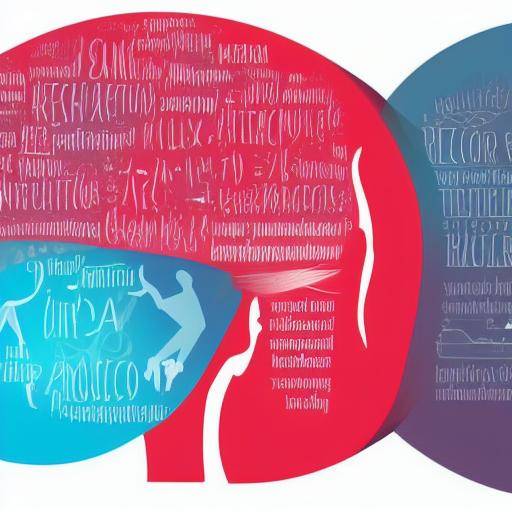
At present, stress management has become a fundamental issue in modern society. The accumulation of labor and personal responsibilities can generate imbalances in people's lives, affecting their mental and emotional well-being. In this article, we will explore in detail how to handle stress effectively to achieve a balance between work and personal life, thus promoting integral well-being. From its historical origin to future trends, as well as practical advice and case studies, we will address this crucial issue for personal health and development.
Introduction
Stress is a natural response of the body to situations that require attention and action. However, when stress becomes chronic or overwhelming, it may have negative effects on physical and mental health. In the workplace, constant pressure to meet the expectations, timelines and demands of work can trigger high levels of stress. On the other hand, the difficulty of disconnecting from work and finding time for personal and family activities can also generate significant imbalances.
In this sense, learning to handle stress effectively becomes a fundamental aspect of improving the balance between working and personal life. The aim is to promote a comprehensive welfare state that allows people to perform optimally in their working environment and enjoy a satisfactory personal life.
History and Background
The concept of stress management has deep historical roots. From ancient meditation practices in Eastern cultures to modern psychological theories, stress management has evolved significantly over time. In the 1930s, Canadian physician Hans Selye introduced the concept of "stress" as a non-specific response of the body to any demand. This conceptualization laid the foundation for future research in the field of psychology and health.
With the advancement of scientific research, numerous techniques and approaches have been developed to effectively address stress. From cognitive-behavioral therapy to mindfulness practices, each approach aims to help people develop skills to cope with and overcome stress in their daily lives.
Analysis in Deep
Stress management carries a number of benefits both at the personal and professional level. Studies have shown that people who manage stress effectively tend to show greater work performance, greater personal satisfaction and healthier interpersonal relationships. In addition, regular practice of stress management techniques can reduce the risk of developing anxiety and depression disorders, thus promoting long-term mental well-being.
However, stress management also presents significant challenges. In an increasingly demanding working environment, people can face a steady flow of stressful situations, which often makes it difficult to implement consistent stress management strategies. In addition, lack of awareness and support by employers may make it difficult to adopt healthy practices to manage workplace stress.
Comprehensive review
To effectively address stress, it is essential to develop a holistic approach that integrates strategies both in the working environment and in personal life. In the workplace, companies can implement well-being programs that include activities such as meditation sessions, breathing exercises and rest spaces. These initiatives not only promote the emotional health of employees, but can also contribute to a more productive and collaborative working environment.
In addition, it is important to foster an organizational culture that values and supports the balance between work and personal life. This can be manifested through policies that promote flexible working hours, rest days and digital disconnection outside the working hours. At the same time, individuals can adopt stress management habits in their daily lives, such as regular exercises, establish clear limits between work and personal time, and seek emotional support when necessary.
Comparative analysis
By observing the concepts of stress management, work-life balance and mental well-being, it is clear that these elements are closely interconnected. Effective stress management is essential to achieving a healthy balance between job and personal demands, which in turn contributes to mental and emotional well-being. Therefore, these aspects should not be considered in isolation, but as interdependent components of a full and healthy life.
Practical Tips and Recommendations
For those who seek to improve their work-life balance through stress management, there are numerous strategies and practices that can be beneficial:
- Practice full attention: Meditation and full attention can help reduce stress and promote mental clarity.
- Set clear limits: Define limits between work and personal life, including determining moments for rest and digital disconnection.
- Prioritize self-care: Dedicate time to activities that generate well-being, such as physical exercise, leisure and social contact.
- Find support: Sharing worries and seeking emotional support can relieve stress burden.
Industry Perspectives and Expert Reviews
Mental health and stress management experts emphasize the importance of addressing these issues in an integral way both individually and organizationally. They emphasize the need to implement policies that foster healthy working environments and support the emotional well-being of employees. In addition, they highlight the crucial role of education and awareness-raising around stress management, thus promoting a culture of care and self-care in society.
Case Studies and Practical Applications
Many cases of companies have been documented that have implemented stress management and work-life balance programs with positive results. These initiatives have not only improved employee satisfaction and productivity, but also contributed to the overall image and performance of companies. Similarly, individuals who have incorporated stress management practices in their daily lives have experienced significant improvements in their emotional well-being and in their personal and work relationships.
Future Trends and Predictions
As society advances towards greater awareness of integral well-being, it is expected that the management of stress, work-life balance and mental well-being will become more relevant in all spheres of life. Companies will tend to take proactive measures to promote the emotional health of their employees, recognizing the positive impact this has on productivity and the working environment. At the individual level, greater emphasis is expected on self-management of stress and personal care as fundamental elements for a full and balanced life.
Conclusion
In conclusion, stress management plays a central role in seeking a healthy balance between work and personal life, in turn promoting mental well-being. By implementing effective strategies to manage stress both individually and organizationally, quality of life, performance and emotional health can be significantly improved. By prioritizing self-care and stress management, people can achieve a more satisfactory balance between their professional responsibilities and their personal well-being, thus contributing to a healthier and more balanced society.
Frequently asked questions
What are the consequences of long-term labor stress?
Chronic labor stress can have significant impacts on long-term physical and mental health, including increased risk of cardiovascular disease, autoimmune disorders, anxiety, depression and emotional exhaustion.
How can I find time for self-care in the midst of a demanding work agenda?
Prioritizing self-care in a busy agenda requires conscious planning and creating healthy habits. Establishing specific schedules for well-being activities, such as physical exercise, meditation or leisure, can help ensure that self-care is not neglected in the midst of work responsibilities.
What role do companies play in promoting work-life balance and managing stress among their employees?
Businesses play a key role in fostering a working environment that values the balance between working and personal life. This may include labour flexibility policies, welfare programs, emotional support and the promotion of an organizational culture that prioritizes the emotional health of employees.
Are there specific stress management techniques that are especially effective?
Various techniques have proven to be effective in stress management, including meditation, conscious breathing, cognitive-behavioral therapy, mindfulness practice and physical exercise. The choice of the technique will depend on individual preferences and effectiveness in each particular case.
How can I set healthy limits between my work and personal life?
Establishing clear limits between working and personal life involves defining specific working hours, establishing periods of digital disconnection outside working hours and effectively communicating personal needs to employers and colleagues.
What is the importance of mental well-being in a working environment?
Mental well-being in the working environment is fundamental, as it directly influences the productivity, labor satisfaction and emotional health of employees. Promoting a working environment that supports mental well-being contributes to optimal performance and healthy working relationships.
Conclusion: In short, managing stress effectively is crucial to achieving a healthy balance between work and personal life. By implementing stress management strategies, fostering work-life balance and prioritizing mental well-being, people can improve their quality of life and their work performance. In addressing these aspects in a comprehensive manner, a healthier and more balanced society is promoted.






















































